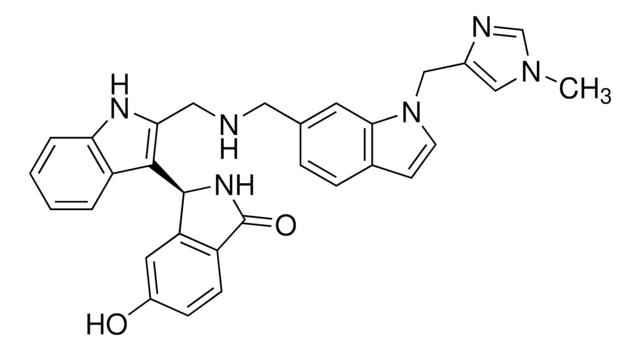SML0084
IM-12
≥98% (HPLC)
Sinónimos:
3-(4-Fluorophenylethylamino)-1-methyl-4-(2-methyl-1H-indol-3-yl)-1H-pyrrole-2,5-dione
About This Item
Productos recomendados
assay
≥98% (HPLC)
form
powder
storage condition
desiccated
color
yellow-orange
solubility
DMSO: ≥9 mg/mL
storage temp.
2-8°C
SMILES string
CN1C(=O)C(NCCc2ccc(F)cc2)=C(C1=O)c3c(C)[nH]c4ccccc34
InChI
1S/C22H20FN3O2/c1-13-18(16-5-3-4-6-17(16)25-13)19-20(22(28)26(2)21(19)27)24-12-11-14-7-9-15(23)10-8-14/h3-10,24-25H,11-12H2,1-2H3
InChI key
ZKJAZFUFPPSFCO-UHFFFAOYSA-N
Biochem/physiol Actions
Storage Class
11 - Combustible Solids
wgk_germany
WGK 3
flash_point_f
Not applicable
flash_point_c
Not applicable
Certificados de análisis (COA)
Busque Certificados de análisis (COA) introduciendo el número de lote del producto. Los números de lote se encuentran en la etiqueta del producto después de las palabras «Lot» o «Batch»
¿Ya tiene este producto?
Encuentre la documentación para los productos que ha comprado recientemente en la Biblioteca de documentos.
Artículos
Naive pluripotent stem cells cultured in vitro using specialized media and inhibitors mimic "ground-state" cells from blastocysts.
Naive pluripotent stem cells cultured in vitro using specialized media and inhibitors mimic "ground-state" cells from blastocysts.
Naive pluripotent stem cells cultured in vitro using specialized media and inhibitors mimic "ground-state" cells from blastocysts.
Naive pluripotent stem cells cultured in vitro using specialized media and inhibitors mimic "ground-state" cells from blastocysts.
Nuestro equipo de científicos tiene experiencia en todas las áreas de investigación: Ciencias de la vida, Ciencia de los materiales, Síntesis química, Cromatografía, Analítica y muchas otras.
Póngase en contacto con el Servicio técnico








